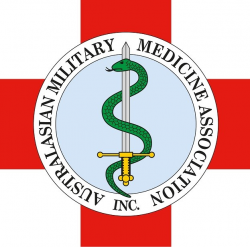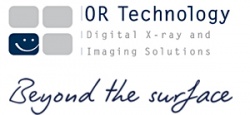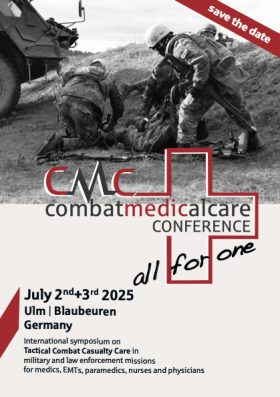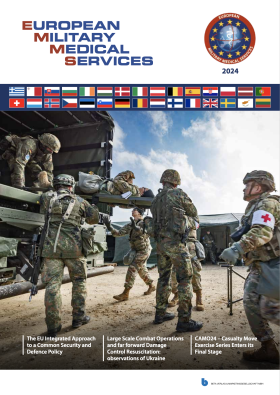
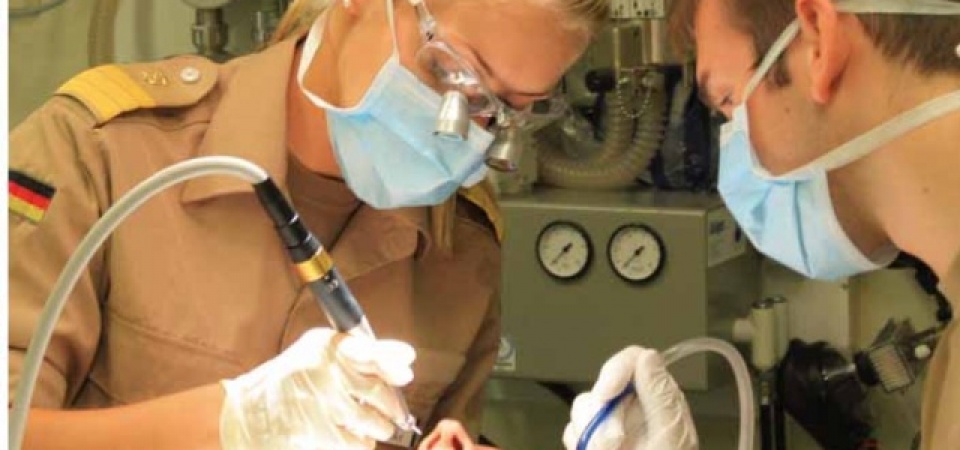
Article
Options of Dental Treatment in Maritime and Land-Based Bundeswehr Operations abroad
Each area of deployment presents the medical forces deployed with multi-dimensional challenges. Often the following principle applies: a minimum of equipment should lead to very good treatment results at a maximum treatment level. In order to meet these specific challenges, specifically trained medical personnel and adapted materiel must be kept available.
Background
While operations by the Medical Corps until the 1990s were mainly of a humanitarian character - for instance after earth quakes or other natural disasters - mainly “robust mandates” form the basis of deployments abroad today due to the multifarious challenges resulting from Alliance policy. For the medical service components involved, this change means the need to assess completely new the operational reality, to adapt materiel, and to train personnel adequately. In times of increasing challenges, sustainability of the units deployed is in particular depending on the physical and mental condition of each individual soldier. The mandatory pre-deployment examination serves to avoid complications in the area of deployment; additional medical support on site is required, however, to be able to manage emergencies. In line with the “Technical Guideline for the Provision of Medical Support to Bundeswehr Units Deployed outside the Federal Republic of Germany” issued by Lieutenant General Dr. Gunter Desch in 1993, medical personnel on deployments abroad ultimately ensures the standard of medical care achieved within Germany. This guiding principle, of course, also is the basis for the detailed planning and further development of dental treatment options.
Treatment Options
– Anytime, Anywhere!
Treatment options largely depend on infrastructure. Equally decisive for effective treatment of the patients under our care, however, is appropriate equipment adapted to operational conditions. Bundeswehr dentists on deployment must be able to sometimes adapt to adverse conditions. During so-called initial entry operations of the Bundeswehr, often only tent-based infrastructure with mobile equipment is available (Fig. 1).
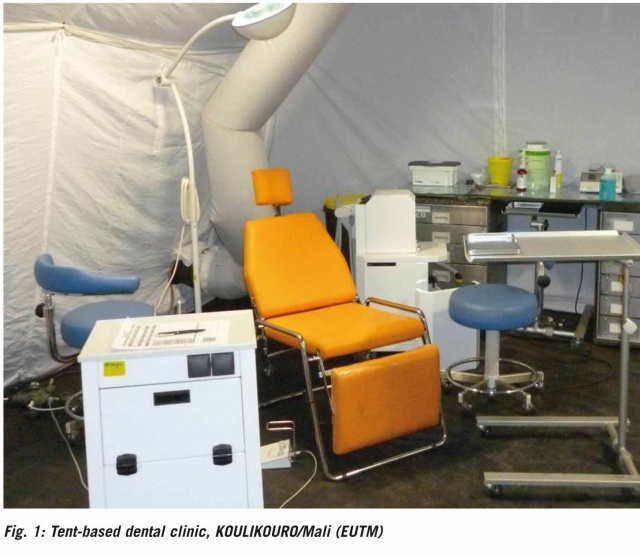
An adequate quality of water can be ensured extremely rarely, in particular at the beginning of operations abroad. Therefore, treatment units with drinking water supply through re-fillable water bottles are well-suited.
Sometimes, treatment providers must dispense for one thing with treating patients in the correct ergonomic position since positioning options are suboptimal, and for another with full diagnostic procedures. Seagoing units, for instance, do not have X-ray capabilities. In order to be able to provide efficient treatment aboard a ship, also external conditions must be taken into consideration. Delicate and fine works at high sea states require some practice and, therefore, should be limited to emergencies. The shipboard dental station “Amadeus” by KaVo Dental GmbH is designed specifically for the needs aboard a ship. The dental chair assistant's and dentist's modules can easily be adapted to and removed from the permanently installed operating table in a space-saving manner (Fig. 2).
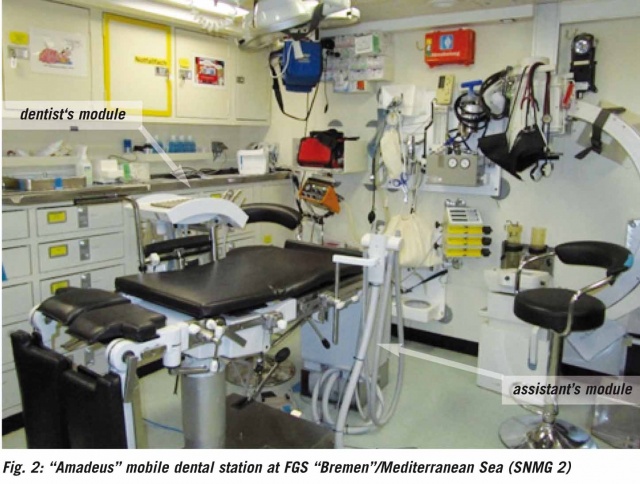
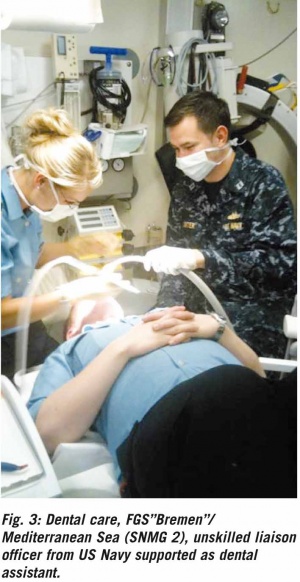
As a rule, dentists on deployments abroad must be able to manage all kind of emergencies also under difficult conditions. During routine duty, cooperation in a well-established team determine the treatment level just like the capabilities of the dentist him-/herself. On operations abroad, however, treatment provider and assistant in most cases meet for the first time. At times, if no qualified dental assistant is available, unskilled personnel must be drawn on. (Fig. 3, 4) Also under these conditions, the ability to adapt swiftly and a talent for improvisation will enable best possible treatment outcomes.
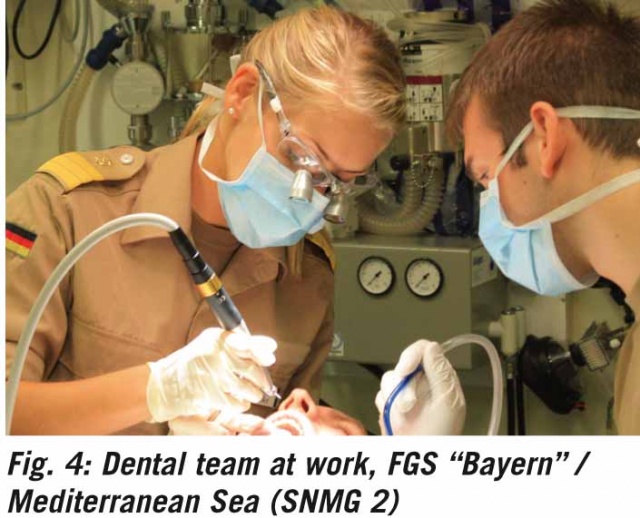
Container-based treatment facilities enable treatments that do not differ substantially from those the soldiers receive in their home country (Fig. 5, 6, 7). Usually, the dentist's work station consists of a treatment container with an attached combination element consisting of X-ray and hygiene work stations. This additional container also comprises all equipment and materiel required for emergency prosthetic dentistry (Fig. 8, 9, 10). Container-based treatment facilities, too, need reliable power and water supply systems to be fully operational. Depending on the country of deployment, this is a particular challenge. Power and water supply can usually be implemented quickly, but as a matter of course, also quality of the water and continuity of power supply must be ensured. In order to be independent of these insecure factors, often also a mobile unit with water bottle supply is kept available.
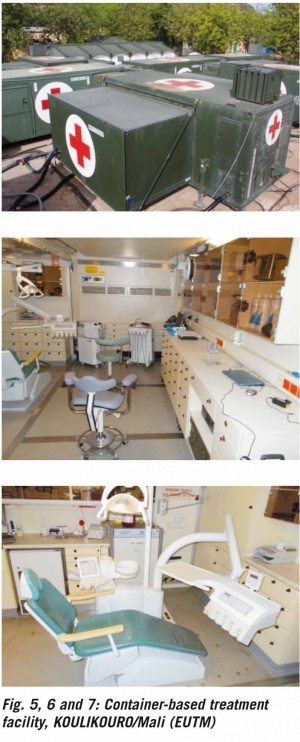
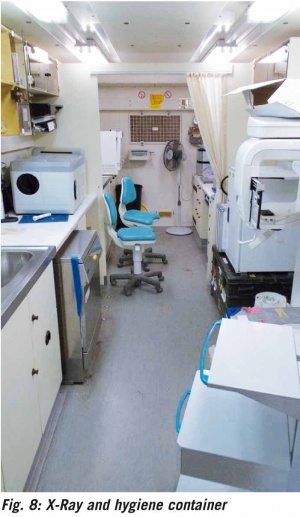
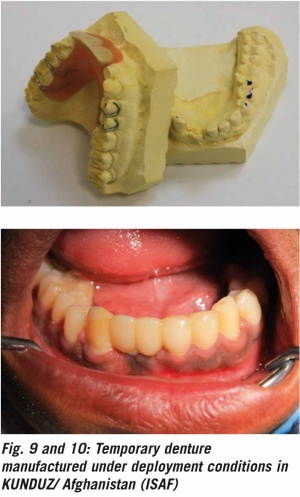
This also applies to X-ray diagnostics. Due to the long transportation routes, it is not uncommon that defective equipment can be replaced only after several weeks. It is therefore essential to keep available alternatives. Mobile X-ray units (Fig. 11, 12), for instance, are used also in container-based treatment facilities in which intraoral and extraoral X-ray units are installed even if these are fully operational – conventional processors for which water supply is essential sometimes may not be used because of the insufficient quality of the water and, therefore, the images cannot be developed.
In long-term operations abroad, fixed facilities are preferred. To this end, available buildings are used or new ones built. In this case, dental treatment and adjoining rooms do not differ from those in a treatment facility in Germany (Fig. 13, 14). Also on deployments abroad, the high standards as to hygiene, occupational safety, and radiation protection must be met. Despite the very good infrastructure, the patient clientele and treatment spectrum remain a challenge for dentists and assistants. Beside general dental treatment, profound surgical skills are indispensible since – depending on the area of operation – also maxillofacial injuries may occur due to combat action. In these cases, the dental team must be able to act as part of the surgical team (Fig. 15, 16).
Generally speaking, the dental treatment team on operations abroad is under a certain tension due to varying climatic conditions, a germ load that sometimes contrasts strongly with the conditions at home, the regional threat situation in general, and the pressure of self-responsibility. On the one hand, we must provide the best possible care to the patients entrusted to us and maintain their operational capability. On the other hand, being separated from our families, austerities of day-to-day mission routine, as well as the fates of our patients or the local population draw on our resources. Especially in land-based operations, the balancing act between the number of patients and available materiel and personnel resources quite often is almost insurmountable. Each dentist on deployment in addition to his/her professional skills also needs coping strategies in order to be able to achieve the best possible treatment outcomes under these adverse circumstances.
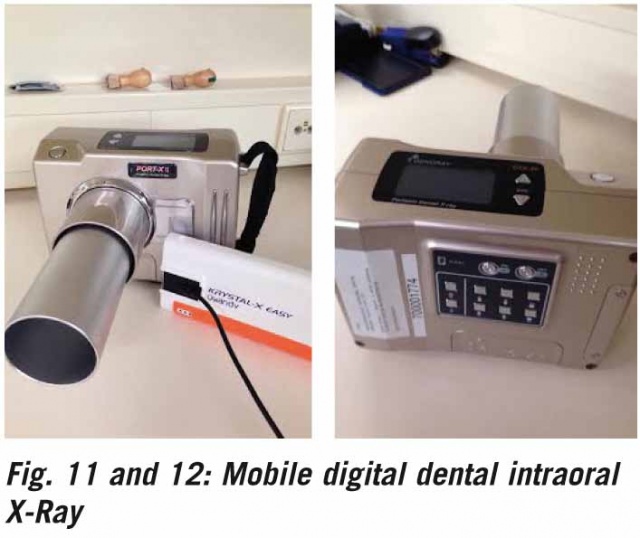
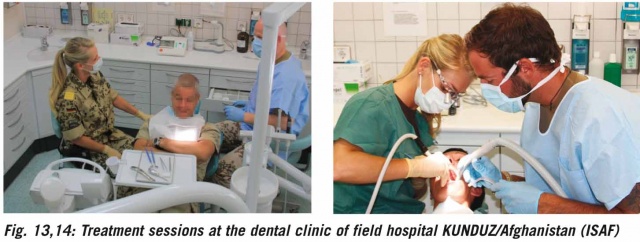
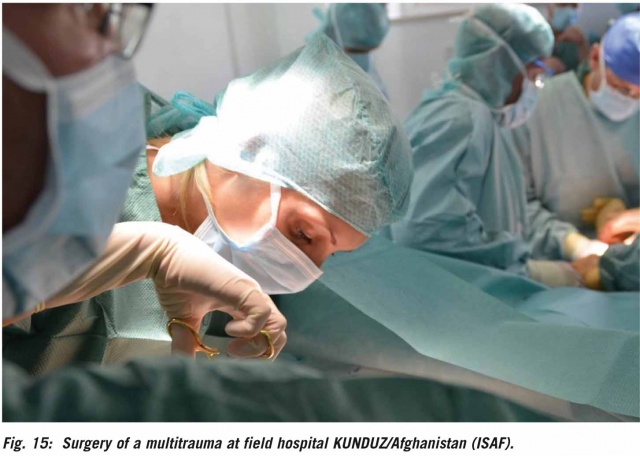
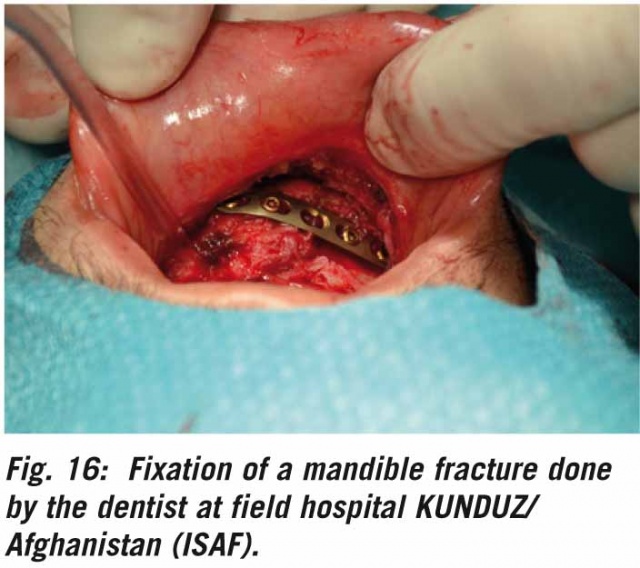
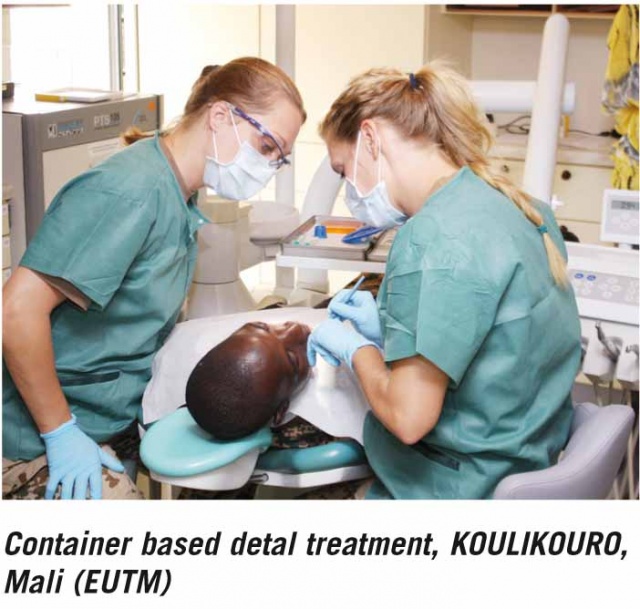
Date: 03/01/2018
Source: MCIF 4/16


